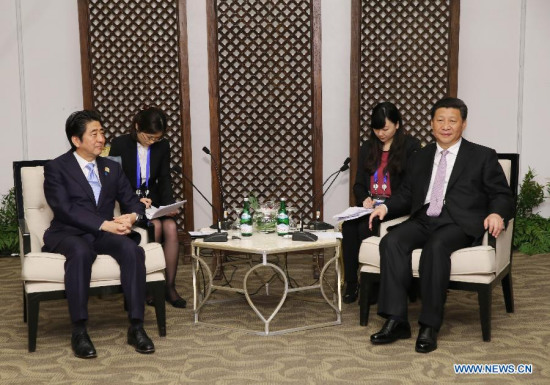
Chinese President Xi Jinping (R) and Japanese Prime Minister Shinzo Abe hold a meeting at the request of the Japanese side in Jakarta, Indonesia, April 22, 2015. (Xinhua/Lan Hongguang)
Chinese President Xi Jinping and Japanese Prime Minister Shinzo Abe held a meeting at the request of the Japanese side Wednesday afternoon on the sidelines of the Asian-African Summit in Indonesia's capital city.[Special coverage]
As the general principle for handling the China-Japan ties, Xi stressed the need to strictly follow the spirit of the four political documents reached between them, so as to ensure the bilateral relations develop on a right track.
The four documents refer to the China-Japan Joint Statement inked in 1972, the China-Japan Treaty of Peace and Friendship of 1978, the China-Japan Joint Declaration of 1998 and a joint statement on advancing strategic and mutually-beneficial relations in a comprehensive way that was signed in 2008.
It was the second meeting between the Chinese and Japanese leaders since November last year, when Xi and Abe met on the sidelines of the 22nd Asia-Pacific Economic Cooperation (APEC) Economic Leaders' Meeting in Beijing. That meeting took place after the two countries reached a four-point agreement to improve bilateral ties, in which the two sides agreed to resume political, diplomatic and security dialogue while acknowledging different positions on the Diaoyu Islands.
Stressing the significance of the four-point principled agreement, Xi said that the history issue is a major matter of principle concerning the political basis of the China-Japan relations.
Xi voiced the hopes that the Japanese side will seriously treat the concerns of its Asian neighbors and send out positive signals on the history issue.
Calling for a positive policy toward each other, Xi said China stands ready to enhance dialogues and communication with Japan to build up mutual trust and reduce doubts and take joint steps to make it a social consensus in both countries that "China and Japan are partners that do not impose a threat to each other."
He said the two countries should maintain communication in various fields to enhance the two peoples' mutual understanding.
Noting that China's initiatives of the Silk Road Economic Belt, the 21st Century Maritime Silk Road and the Asian Infrastructure Investment Bank have been echoed positively worldwide, Xi said that peace, development and win-win cooperation represent the irreversible trend of the times.
"China will firmly stick to the path of peaceful development," said the president, urging the Japanese side to work together with China to make more contribution to peace, stability and prosperity in the region and the world at large.
The two countries' leaders should shoulder their responsibilities and duties, Xi stressed.
For his part, Abe said that he was very happy to meet President Xi again and that he keenly looked forward to improvements of the bilateral ties.
The development of the Japan-China relationship benefits the two peoples and helps promote global peace and development, Abe said, adding that he agrees with Xi that the development of the two countries does not pose threats to each other.
Abe said the Japanese side will implement the four-point principled agreement reached with China last year and boost the exchanges and dialogues between the two countries in various fields so as to enhance mutual understanding between the Japanese and Chinese peoples.
The Japanese prime minister said he and his cabinet have made promises on several occasions that they will follow the Murayama Statement and honor the words of former Japanese governments on the history issue.
The stance will not change, Abe said, adding that Japan is determined to follow a path of peaceful development.
The Japanese side has recognized that there is immense demand for investment in infrastructure in Asia, and is ready to talk with China on the Asian Infrastructure Investment Bank, said Abe.
















































